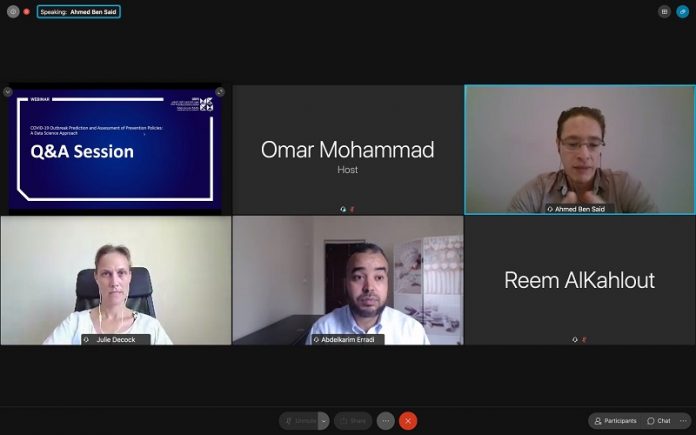Efforts to assist policymakers in accurately forecasting and responding to COVID-19 outbreaks, as well as supporting the next generation to pursue a career in biotechnology, provided the context for two webinars recently organized by the Qatar Biomedical Research Institute (QBRI) at Hamad Bin Khalifa University (HBKU).
As part of its QBRI Talks webinar series ‘Guide for Early-Career STEM Researchers Career Development’, QBRI held a webinar titled Pursuing Careers in the Biotech Industry, on November 18. During the webinar, Dr. Lawrence Stanton, Director of the Neurological Disorders Research Center at QBRI, shared his perspective on careers in the biotechnology industry, particularly the transition from academia to industry and the key differences between these two research environments.
Dr. Stanton also discussed the required skill set for pursuing a career in the biotech industry, which has been playing a major role globally in developing diagnostics, therapies, and vaccines to fight the coronavirus. This session was moderated by Dr. Adviti Naik, Postdoctoral Researcher at QBRI.
Through the QBRI Talks webinar series, the institute features inspiring talks from pioneers who discuss their personal journey in a scientific career, with the aim of sparking conversation among young minds to actively pursue personal and professional development.
Running in parallel with the career development series, QBRI is also hosting another webinar series dedicated to highlighting various topics of current global significance. COVID-19 Outbreak Prediction and Assessment of Prevention Policies: A Data Science Approach, was held on November 9, and presented to the audience two COVID-19 prediction models. The first module used a deep learning approach to forecast the cumulative number of cases based on data from countries with similar demographic, socioeconomic and health sector indicators. The model also takes as input adopted lockdown measures.
By contrast, the second approach used a deep learning model for evaluating and predicting the impact of various lockdown policies on daily COVID-19 cases. This was achieved by grouping countries with similar lockdown policies, then training a prediction model based on the daily cases in each cluster along with the data describing their lockdown policies. Once the model is trained, it is used to evaluate scenarios associated with lockdown policies and investigate their impact on predicted COVID-19 cases.
The prediction models were demonstrated by Dr. Abdelkarim Erradi, Associate Professor in the Computer Science and Engineering Department at Qatar University, whose research activities and interests focus on service-oriented computing, cloud services composition and mobile crowd sensing. He was joined by Dr. Ahmed Ben Said, Data Scientist at Qatar University with an interest in machine learning, computer vision, urban computing and mobile health systems.
During the compelling webinar, they used Qatar as a case study to highlight the potential consequences of lifting restrictions without fully taking into account what the data reveals about the current status of COVID-19.
Dr. Erradi highlighted that harnessing the power of data science and recent advances in machine learning can help us achieve a better understanding of COVID-19 outbreak. The trained prediction model allows for the evaluation of various what-if scenarios related to lockdown policies, such as easing travel restrictions, and quantifying their impact on predicted COVID-19 cases. He also acknowledged funding support from Qatar National Research Fund (QNRF) as part of the Rapid Response Call (RPC) to address COVID-19.
Dr. Julie Decock, a scientist at QBRI, and moderator of the webinar, said: “While policymaking responses to COVID-19 vary from one country to another, all are united by the need for accurate forecasting of the coronavirus’ propagation. This webinar demonstrated that data science approaches have an important role to play in predicting and tracking the spread of COVID-19. As always, we enjoyed hosting our colleagues from Qatar University.”
For more information about QBRI’s state of the art research facilities and centers focusing on research related to diabetes, cancer and neurological disorders, please visit qbri.hbku.edu.qa






